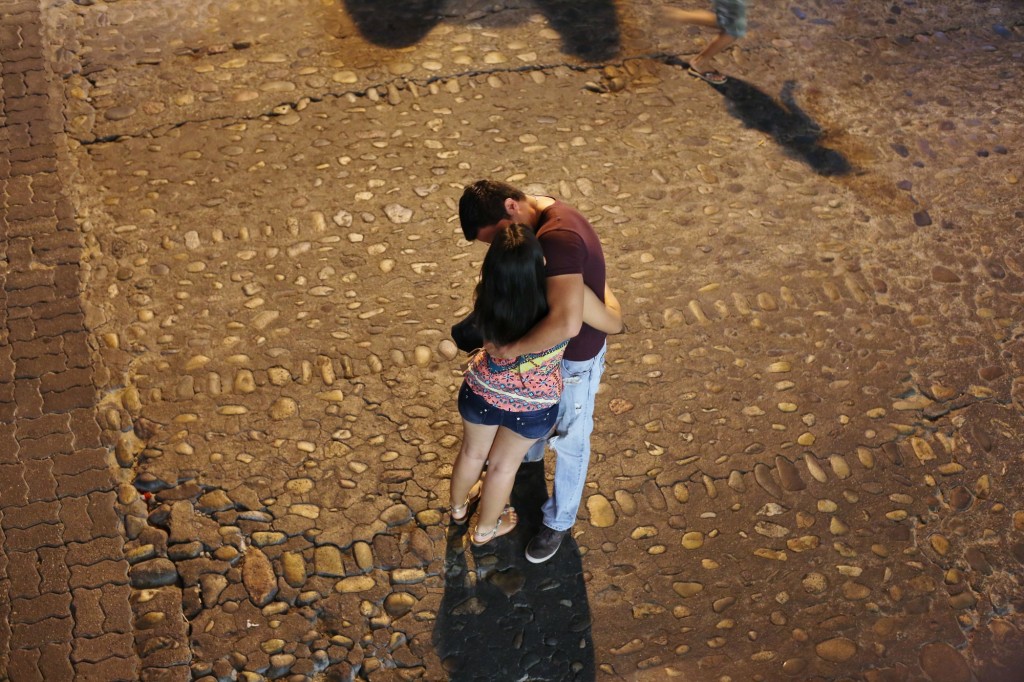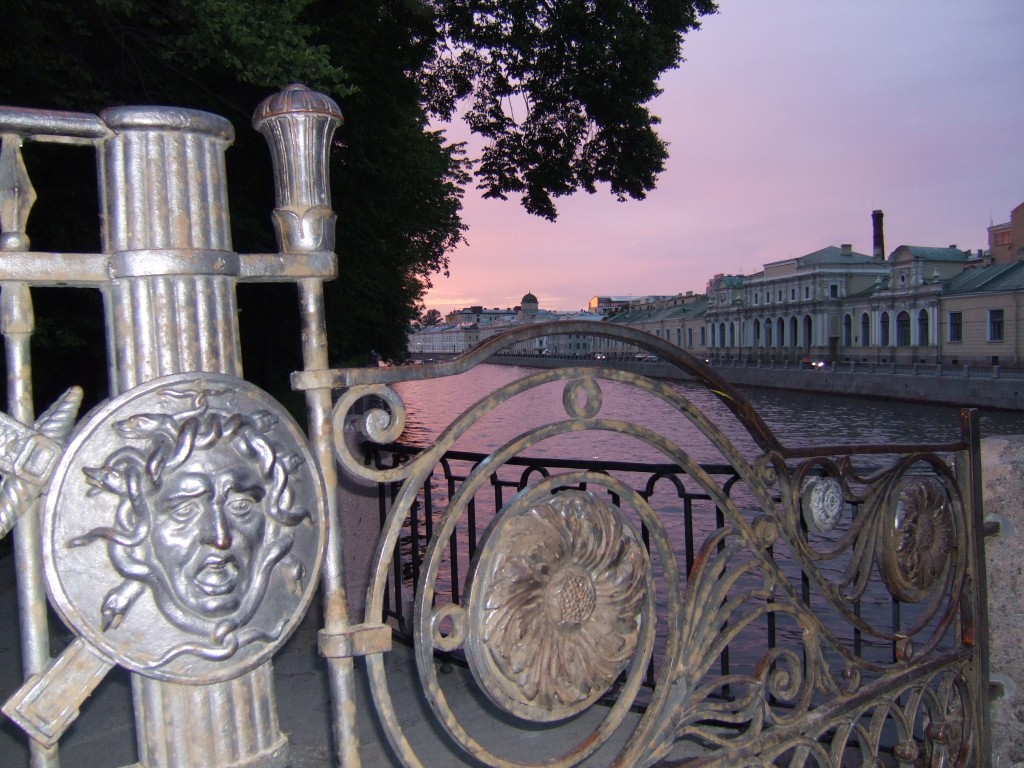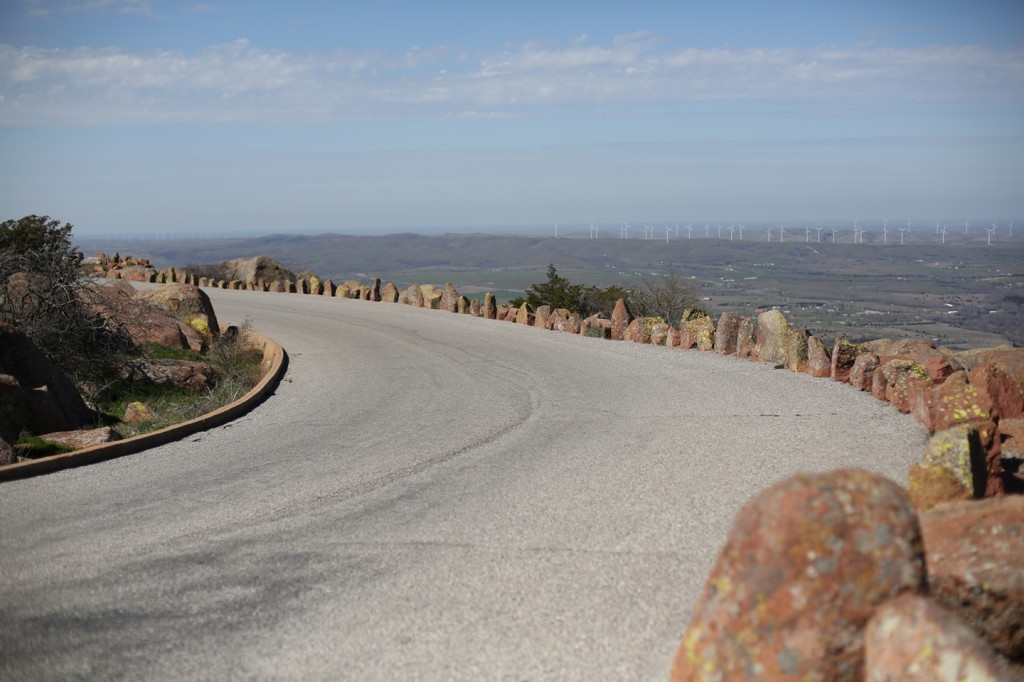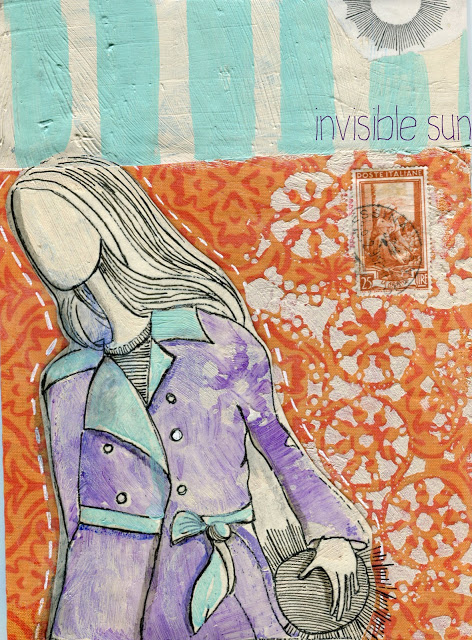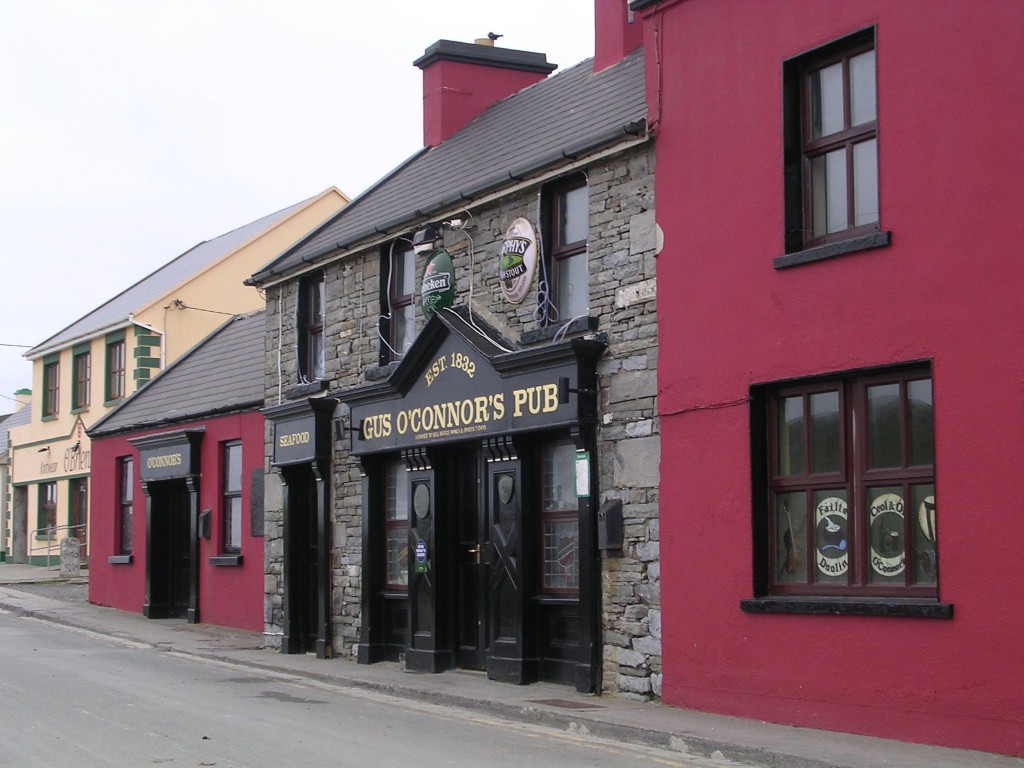
By Josalin Saffer
Cambodia feels like an open wound. Still raw from a scrape with death, still aching from its painful roots. Reminders of the genocide are everywhere: in the eerie absence of the elderly; in the mountains of garbage that clutter the roads and define the landscape; in the pleading tone of the desperate tuk tuk driver, hoping for a day of work; and in the perfectly rehearsed sales pitches of the children peddling baskets of discount Lonely Planet guidebooks on every street corner.
For the second time in five months, I am walking the half-mile stretch to cross the border at Poipet—the gateway into Cambodia and the portal to its poverty. It’s hotter this time. It’s now summer, and the tropical sun rules the land in a brutal tyranny. After eight months of traveling, I’ve grown accustomed to the musty stench of my soiled clothes and the taxing load of my backpack that contains everything I own, but never to the heat. As I walk under the stone archway inviting me into the Kingdom of Cambodia, the black dots of dehydration appear in my periphery like passing planets to a sun-bound astronaut who’s drifted off course. My head is forever trapped in a fogged-up fishbowl.
Poipet is not a coastal town, yet everywhere there is evidence of a shipwreck. Scraps of plastic, cardboard, styrofoam, metal, and human flotsam appear to have washed ashore. The people I see seem like the only survivors, still recovering from this thalassic catastrophe. Families huddle together under facades of crumbling concrete, the remnants of homes. Everyone walks slowly, staring at nothing, myself among them. I can feel crow’s feet forming in the corners of my eyes from all the squinting. One thought raps relentlessly on the front door of my frontal lobe: I need water.
I search in vain for someone who looks like they might be sitting on a cooler, a makeshift minimart that often flanks the streets. But for the first time in Southeast Asia, I can’t find anyone to sell me anything. People are preoccupied, squatting low, on their haunches, with their faces covered and averted from the sun, trying to avoid the heat.
I am jolted from my feverish quest by a tug on my pinky finger. Two deep, dark eyes stare up at me, their depths like the abyss of a cave. A girl who looks to be about three years old stands obstinately before me like an avant-garde performance art piece. The canvass of skin covering her bones appears painted in haste, with sloppy brushstrokes, muddy streaks. She clamps her entire hand around my littlest finger with a firm grip and without the slightest indication of letting go.
“Excuse me, lady, one dollar. I need a dollar, lady. Please, lady, give me a dollar,” she chants.
I have a dollar. In fact, I have 300 of them stuffed neatly at the bottom of my pack. I had stashed them away for this very trip to Cambodia. As my semester teaching in Thailand neared its end, I carefully regulated every saved penny from my salary to fund a final trip around Southeast Asia before returning home to Atlanta.
Never giving money to panhandling children; it perpetuates their livelihood as beggars, I repeat in my head, the way I used to prepare for lessons and study for tests.
I had spent weeks reading and researching everything from personal blogs to the BBC. And every source answered my question of whether to give money to child beggars with a firm and stern don’t do it. They each echoed the same warning: “By feeling pity, giving money and food, child labor—a growing business—is supported and the children are sustained on the streets.” On paper, it made sense. And my response seemed easy.
But standing face-to-face with a three-year-old in Cambodia, my heart sinks and I panic. As a teacher and a student, I have never been as unsure of my answers. I can’t stop myself from thinking: What if they are wrong?
Reluctant to pull my finger from hers, we walk pinky-in-hand for several more steps before I finally untangle myself from her taut grip. I look at her and she expects me to speak, but instead of answering her question or acknowledging her presence, I look away. Our locked eyes make me feel a thousand times heavier than the fifty pounds I am carrying. A weight that recurs continually here, always with the threat to bury me in a quicksand of indecision. Eventually I tell her “No, I’m sorry,” but she follows me, tries to walk in my path, demanding me to notice her. She repeats her haunting mantra as if in a trance, “Just a dollar, lady.”
•••
Ten months prior, I was in Atlanta, sitting on my bed, thumbing the glossy pages of a National Geographic, and fantasizing about the day I would soon be in Cambodia. It was a picture of Ta Prohm that had summoned me. The twelfth-century, tree-entwined Buddhist monastery was the stage for Lara Croft’s adventures in Tomb Raider and is one of hundreds of ancient temples that stand alongside Angkor Wat in Siem Reap. On two full pages, creeping strangler figs and slinking lichens devoured the once indestructible ruins. It was a perfect crystallization of nature’s dominance over mankind. A reminder that nature can undermine even the apotheosis of human creations. I ripped out the pages and kept them in my purse for weeks. I wanted to be here, to feel small, and to stay inside this photograph forever.
When the day came for me to shrink my life into a backpack, I was staying at a friend’s house. Scattered across her floor were the remainders of my purged possessions and the things I would take with me. There were stacks of clothes separated into two piles—one for teaching and one for adventuring. There were labeled Ziploc bags, a diary of Anaïs Nin, a Canon Rebel. An empty journal and a manila folder stuffed full of goodbye cards addressed “Dear Miss Josalin.”
There were fifty of them, actually. One from every kid at SoulShine, the liberal afterschool program I worked at as a teacher and counselor in Atlanta. I picked up a card signed “Love, Emilia,” depicting an underwater scene: blue, squiggly lines for waves, spider-like crabs, swaying palm trees, and a mermaid replica, exactly the way I would have drawn it. For months at Soulshine, there was a mermaid craze, and it all began with Emilia.
Everyday after school, she would rush inside, throw her backpack to the floor, scarf down a hasty snack, and climb onto my lap. I loved the way her crimson curls bounced, giving off warmth and complementing her fiery spirit. I would twirl them in my fingers and she would, without fail, ask “Miss Josalin, today can we draw mermaids?”
I am not an artist, and my drawings were, at best, mediocre. But to Emilia, they were masterpieces. She praised me for them, begging me to teach her every step of my drawing process, eventually surpassing my talent and producing them en masse. The kids at SoulShine started to take notice, and soon every girl and even some boys were bombarding me with requests for drawing lessons. For hours after school, I would show them how two pencil strokes could make a ponytail and how a mix of blues, greens, and gold glitter create an iridescent fin. How a “3” and a capital “E” formed the outlines of a seashell chemise and how long eyelashes make the mermaid feminine.
Flipping through my cards, I saw dozens of mermaids. I closed the manila folder and wedged it alongside the few other carefully chosen items in my pack.
•••
In Poipet, I surrender my quest for water and opt for a beer instead. It’s ten in the morning, but I feel like I’ve been in this city for centuries, and the cold, foamy taste in my mouth provides a refreshing relief. I try to focus, envisioning Ta Prohm, and examining the bus schedule to Siem Reap. Waiting for the bus, a young girl races me to the trashcan to salvage my beer can. She wears a ponytail and shuffles by with shaky, knobby knees, hunched over like an old woman. Her shiny, thick hair whips like the tail of a black stallion, with features both bold and refined, in utter defiance to her demeanor. She holds her t-shirt stretched out like a basket in which she carries her collection of tourists’ trash—her treasures.
I watch her attempt to add my can to the pile and fail. Her shirt collapses, revealing her scrawny frame, and bottles and cans topple in every direction toward the ground. She looks around, eyes racing with the trajectory of launched pinballs. Gathering the bottles, she drops them two more times before scurrying away. In a few seconds, she vanishes from my sight, but her presence lingers in my mind. Sitting and waiting, I wonder: Would these children be forced to sell and beg and scrounge and steal for their lives if their families hadn’t been butchered and uprooted in a ruthless genocide?
From 1975-1979, Cambodia’s government systematically massacred three million of its own people. Promoting a radical agenda of nationwide ethnic cleansing, Pol Pot and his obedient Khmer Rouge regime rivaled the Nazis in organized cruelty. With horrifying gusto, their motive was to purge and reform the population in place of a pure, agrarian Communist society. The entire country suffered, but the Khmer Rouge singled out certain people as the enemy. Among those targeted were intellectuals, city folks, minorities, teachers, writers, doctors, and people who wore glasses. When the Khmer Rouge took power, they captured Phnom Penh, the capital, and evacuated the entire city in three days. Once bustling, thriving cities became wastelands and torture camps. The displaced people met their fate in an orderly fashion: They were herded to labor camps, then torture prisons, and, ultimately, to their death in the killing fields.
My bus pulls out of the station and leaves the forgotten shipwreck survivors to fend for themselves. Poipet disappears behind me in a dusty dirt cloud like the phantasmagoria of strange dreams. I gaze out the window at vast, barren fields and conical tops of straw hats and wonder what the people beneath them had seen and felt and suffered when Pol Pot reigned supreme.
To save cash and prevent scams, I rent a bike from my hostel in Siem Reap at dawn the next morning. Ten kilometers of dirt roads and dodging tuk tuks, and I am finally amid the ancient ruins of the Angkor Empire. It is low season, so there are not many tourists, most of them choosing to avoid the oppressive heat. Normally this would be a good thing, but in Cambodia it means I am an easy target.
I arrive at Ta Prohm temple with high expectations, burning thighs, and half the vigor of Lara Croft. As at many of the popular Angkor temples, the atmosphere is frenzied. Tourists strike stupid poses, snap photos in rapid succession, and discover hidden crevices by way of their own routes. Local merchants cast their well-practiced lines into a sea of unsuspecting tourists and wait to see who falls for the bait. Their merchandise is often handmade: wood-carved finger flutes, jangly jewelry, charcoal sketches of Angkor Wat, and hand-painted clothing. All for one dollar.
Through the chaos and crowded amalgam of flashy new Apple products and sweaty bodies, I see my enchantress. The divine tree fatally intertwined with the ruins from the two-page photograph. Like a comfortable houseguest she sprawls out and makes herself at home in a sacred room of the ancient monastery. I situate myself in just the right place and take the very same photograph, though not as high-res and with an amateur’s eye. I take hundreds more as I explore Ta Prohm. It provides me with endless inspiration, and the ruins invoke my creative spirit. But what captivates me is a pair of young merchants. A brother and sister no older than nine with bright red baskets and stockbrokers’ enthusiasm. Squatting on a mound of rocks that have been squeezed out of place by thick, gnarled roots reclaiming the jungle, they scope out the torrent of tourists entering their domain. They wait like watchdogs, sniffing me out immediately.
“Lady, I have very nice jewelry for you. Come here, lady. I have many, many things for one dollar,” the girl says, arms draped with bracelets from her wrists to her armpits.
I’ve prepared something to say this time. Silence, I convince myself, reveals weakness. I try to appear honest and confident, hoping my answers will suffice them.
“I can’t today. I will be back though. I will come and buy some tomorrow.”
She glares hard at me. Her brother stands behind her with one hand on his hip, the other cradling his basket like a baby. I shrug my shoulders and reveal my empty hands.
“Not tomorrow!” she says, now indignant and miffed by me. “You buy now, lady. Tomorrow, I do not see you.” Wiping the palm of her hand down her face, “All farangs [foreigners] look the same.”
And indeed she does not see me. She sees what she wants to see: a rich, white tourist crippled by guilt who might dish out pity in the form of American dollars. And I try hard, but I do not see her either. I want to see a nine-year-old who runs through the ruins playing hide-and-seek with her brother, laughing and skipping, and free to just be. I want her to hold my hand and ask me about my funny clothes or my pale skin or if she can braid my hair. I want to see a child with the innocence that reminds me not to take life too seriously.
Just then, the wind kicks a slight breeze. A delicate dandelion flower floats by, hovering in the air briefly. The two siblings fall silent and still, their eyes fixed on this evanescent wisp of beauty until it drifts out of sight. And in this moment, they abandon their roles as pushy street merchants and again become children. I snap a photo of their sudden transformation and steal this moment for myself. When the dandelion vanishes, so too does their laughter and wonder. In Cambodia, this phenomenon of children behaving like children surfaces only in glimpses. I take a few more unimportant shots of big trees and crumbling rocks and exit the temple.
To my surprise, my bike—secured with a flimsy, shoestring-sized cable lock—is right where I left it. I try to drone out the cacophony of auctioneers offering me water and make a beeline for my two-wheeled getaway. But I am promptly intercepted and detained by a thin, young boy and eager guide. His hands are callused, and I feel tender when they touch me, grabbing my arm and dragging me along quickly. He seems like he has something to show me, but I soon realize it is me that he is showing.
He presents me to a group of kids of staggering heights and ages. They are his cohorts and his siblings, and it is clear who calls the shots. He points to the youngest, gives her the cue, and she yokes me with her eyes and begins rattling off her ABC’s.
“She can say her ABCs for one dollar,” my kidnapper says proudly.
I look around for an adult, but I see no one. And I remember reading that parents often get their children to do their begging for them. Smaller, cuter, and livelier, they have been proven more successful on the streets.
When he sees me turning to walk away, he runs after me, trailed closely behind by his well-trained posse. They crowd around me, hurling English phrases and fragments, convinced of their ability to sway me.
“Look, I can count to ten! One, two, three, four….How about ten bracelets for one dollar or a bottle of water? You are very thirsty, lady.”
I had seen this business savvy before. The same precocity, but with different motives.
•••
A master of the ocean realm, Emilia soon advanced to drawing castle-dwelling beauties. She was diligent and her hobby easily gained momentum within her circle of friends. She started a drawing club composed of six core members and a handful of transient contributors who came and went depending on the day. After snack, Emilia would dump out every box of crayons into a massive pile in the middle of them, and the others would elbow each other to get a spot at the big picnic table. First attempts at mermaids, princesses, dragons, and castles littered the floor daily. Somehow crayon nubs covered entire pages with fantastic scenes and not an inch of wasted paper.
They drew constantly. And in a seamless transition from schoolgirl to sales executive, Emilia started a business.
“Miss Josalin, look at the mermaid I drew, just like you!” Emilia boasted. “Will you buy a picture?”
“Oh yeah? How much?” I asked, amused.
“You can get one for fifty cents or four for one dollar!”
Of course I bought them. I bought them all, with whatever change I had lying at the bottom of my purse. It didn’t seem to make a difference if I gave a dollar to some children. But these were children who had three meals a day and shoes on their feet. Children who got back rubs for bad dreams, and Band-Aids for boo-boos, and kisses just because. They didn’t need my money. The quarters I gave them would gather dust at the bottom of their piggybanks.
In Cambodia, my dollar holds power. And I’m unsure of how to wield it. Sometimes, I think I came here expecting to watch a performance, like an audience member snug and relaxed in her seat. Instead, with the swift crossing of the border, I am dragged on stage and thrust into the scene. How am I supposed act? What am I supposed to say? The plot is complex, and no one gave me a script. Uncomfortable and blinded by the spotlight, I improvise. I hold my breath, believing that a botched line or a missed cue could sabotage the entire show.
I am constantly torn, thoughts bisected between not knowing how to help and how not to hurt. I struggle to reconcile my heart with my head, my guilt with my gut, constantly. I am suspended in a state of hopelessness and inner conflict, always. Here, I am forced to confront life’s injustices and contradictions. Here, I learn that there is not an answer for everything. The aftermath of genocide is not easily reversed, and the people will go on suffering, creating, destroying, enduring.
•••
JOSALIN SAFFER lays her roots in Atlanta, Georgia, where she received her B.A. in Journalism. She spent the last year living, writing, and working as an English teacher in Thailand and exploring Southeast Asia. This fall, she will continue her journey as a writer and teacher in the Czech Republic. Her writing has appeared in The Guardian Weekly, The Matador Network, and South East Asia Backpacker magazine. To read more of her published work, visit www.josalinsaffer.com.

 Follow
Follow
